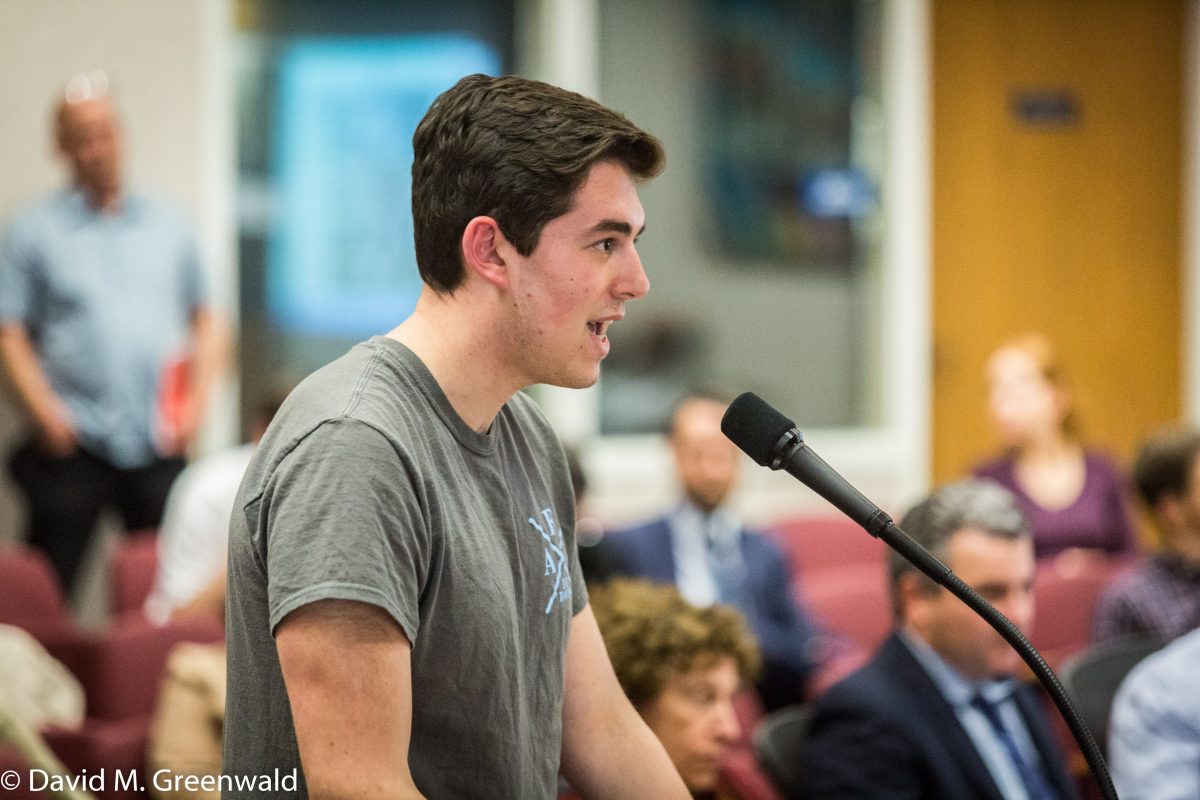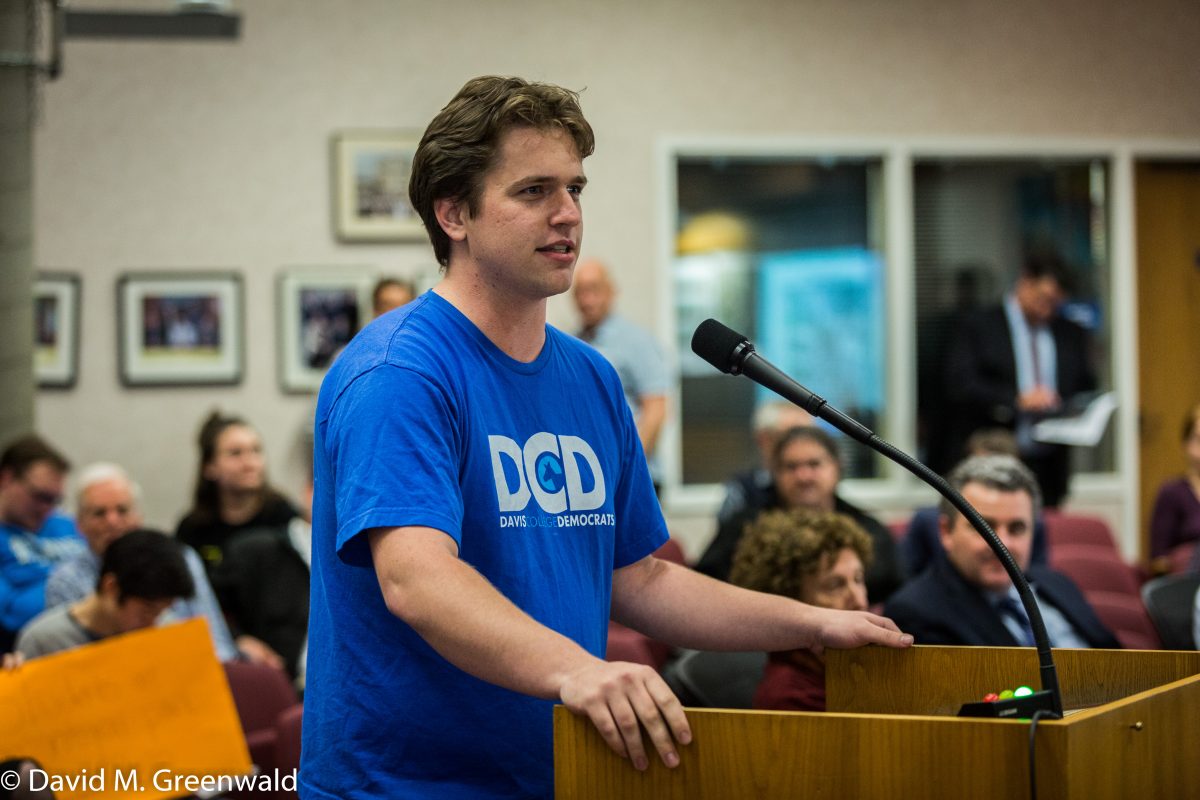

It was not that long ago that land use battles were dominated by longtime residents and project proponents – but that landscape is changing and changing rapidly. Students have been coming out in large numbers over the last year for student housing projects and even Trackside.
What we saw on Tuesday was extraordinary though, where project opponents were greatly outnumbered by project proponents for Lincoln40. The student voices led the way, but were not exclusive to the effort.
In this article, we present the views of four student leaders: Outgoing ASUCD President Josh Dalavai, incoming ASUCD President Michael Gofman (who will be installed today), incoming ASUCD Senator Alisha Hacker, and Aaron Latta, who has emerged as one of the biggest leaders in the student housing movement.

Josh Dalavai said that one of the biggest issues during his tenure and over the last four years has been the housing crisis. He said the two problems he has tried to address “are prevalent concerns”: affordability and responsibility.
“The student perspective is that it is a shared responsibility between the city and the campus to construct housing for additional student growth and our additional students,” he explained. “We have not let the campus off the hook in our advocacy for student housing. We’ve tried to avoid solely lobbying the city and developers to fill that need. We believe that it is a primary responsibility of the UC Davis administration as well.
“That has been reflected in some of the chancellor’s new announcements for new beds, on-campus housing. It’s not where we want it to be, and it’s not exactly as affordable as we’d like it to be, but it’s been happening nonetheless,” he said.
He said he supports Lincoln40 because “it’s not a luxury item but rather a necessity. We are looking forward to the market rate going down.”

Michael Gofman said, “This is a need. We can’t see our vacancy rate go up, we can’t see our prices go down unless we have more supply.”
He said he “fully supports this project.” He added, “During my term, I plan to keep the pressure on the administration to fulfill their end of the deal. Good enough isn’t good enough. We need more. We need more from the city. We need more from the developers. And we need more from the administration.”
He said, “I plan to push on all of those avenues to make sure that students and the students get everything that they need.”

Alisha Hacker, incoming ASUCD Senator and freshman at UC Davis, added her voice to the chorus of students speaking out for student housing – many of whom came out despite the fact that next week is finals week.
“This project is made and designed for students,” she said. “It will make a dent in the housing crisis. I don’t think we can reiterate enough, this is an issue directly affecting students.”
She said as someone who currently lives on campus, “I’ve been lucky that I haven’t been someone that’s experienced the fact of who was going to pay the rent this month… but I know it’s going to be something that I experience in the future. Having more rent by bed options is just going to be more beneficial to students.”
She pointed out that Lincoln40’s proximity to campus means “students don’t have to worry about driving.” She said, “It can alleviate some of the parking challenges that are already facing the university campus.”

Aaron Latta is with the Davis College Democrats and he also heads up an emerging group called the Davis Housing Brigade that focuses on issues of student housing. He thanked the council “for the support you have given for addressing this crisis.”
He pointed out that the council has “taken stances that have earned you quite a bit of ire from the community. Personally I think that takes a lot of willpower.”
He spoke to the issue of rent by the bed, which has been one of the flashpoints of concern within the community.
He said “that would have helped me in my first rental situation.” He said, in 2013 he rented his first apartment. It was he and two other guys, but the third person “stopped paying rent after three months.
“We were all on the same lease, it was all co-signed by my dad, and when he stopped paying rent, and he ended up leaving the lease before we were ready, it ended up making all of us responsible for his mistake and his irresponsibility,” Mr. Latta explained.
“On top of that it put my father into financial jeopardy as well,” he said. “The point is that the traditional rent by the unit system puts an undue liability and risk on the students.”
He said, “Had I been in a scenario where I had been just able to pay and be liable for my own bed, then I wouldn’t have had to deal with that risk. I could have focused on my studies and not whether I had a place to live that year.”
He called Lincoln40 “trendsetting,” stating, “It is the first ever affordable housing program aimed at students. When this gets approved, it will enable Davis to once again be the center and at the forefront of housing policy across the nation. I’ve looked, there are no other programs like it.”
—David M. Greenwald reporting


And the latter was so not appreciated, especially just to make a point over housing supply innapropriately using a non-student-oriented project that has other major issues.
Yeah, that happened to me, too, 30 years earlier, and happened to a lot of students I knew back then and have known since. And back the the vacancy rate was much higher. It happens all the time in Davis and and other college towns.
Rent by the bed is a fantastic concept that I would have used where it available to me in the early 80’s
“Rent by the bed is a fantastic concept”
I have yet to meet a student who dislikes the idea of rent by bed.
I have also not read a *satisfactory* explanation as to what is wrong with it. Ron’s answer has been that these are the result of university negligence, but that doesn’t address a specific issue of form, it only impacts the issue of whether we should build the student housing at all.
My ears are burning!
One thing it does is to ensure that bills for water and electricity cannot be directly tied to usage, thereby providing no incentive to conserve (and ensuring that “wasters” pay the same amount as “conservers”). This has already been discussed on the Vanguard.
Utility usage is planned to be a flat rate (for each renter), regardless of usage. (The built-in lack of incentive and resulting waste has already been demonstrated at West Village, as I recall.)
Can’t remember if there’s other concerns (regarding “rent-by-the-room”). But, you’re singling out a single factor regarding the megadorms. The other impacts of these have already been discussed, at length.
Very few multifamily homes (if any) in Davis are individually metered for water.
By covering the costs of electricity, water, cable, internet, sewer, the students are advantaged not disadvantaged. A selling point is that they cover the cost of utilities.
The water issue is bs anyway. Students in apartments aren’t going to use a lot of water because they don’t have exterior water use and most won’t have individual washers either. For the most part a student who uses the water for showers, dishes and toilets are not going to use a lot of water and aren’t going to have a lot of incentive to conserve anyway.
David: “A selling point is that they cover the cost of utilities.”
Your entire focus is on what’s best for student renters, vs. broader goals regarding conservation, fiscal impacts, loss of commercial space, displacement of non-student renters, and generally enabling UCD to continue transferring these impacts to the city as a whole.
Pretty damned irrelevant really. Most water wastage is in yard uses. How is a student with a sink and shower going to waste water? Take too long a shower? Overwash their vegetables? This isn’t like watering a lawn or filling a pool. Not even worth the cost of a meter.
Oh, yeah – there’s the likelihood that occupants will not be able to get rid of a “problem” tenant, as long as he/she is paying the (individual) rent. (And, it’s probably more likely to be a “stranger”, vs. a friend or someone that the other tenants have personally “screened”.)
But they can also move as a remedy without breaking the group lease.
You’re presupposing that just because there is a rent by bed, it’s going to be a stranger. The way it is more likely to work is a group of friends will move in together but sign individual leases. I don’t know why you are of the belief that it will be random housing assignments.
I truly doubt that.
Wasn’t there some kind of reality show, in which strangers were thrown together into a house (and filmed, with the resulting “drama”)? That’s pretty much what I picture, regarding the megadorms.
The only difference is that we won’t get to see the video. (Well, unless someone posts it. Seems like people post all kinds of crazy stuff, these days.)
But again, you’re only focusing on one aspect of the megadorms, and without considering the impact on the city as a whole.
This isn’t a new thing. I’ve talked to countless student renters who have lived in rent by bed situations, they live with their friends, they sign individual leases. Educate yourself please.
People seem to think rent-by-the-bed is new. There have been units doing that for several years in Davis.
In general, I think it’s more likely that the “preferred” option for a group of friends will (still) be to rent a house. (Either on their own, or perhaps one that is owned by one of the occupant students – or their family.) Cheaper, more freedom, free parking in the neighborhood, etc.
The megadorm option will be for single students, rooming with strangers. (For double-occupancy, it will be a true “dormitory” experience.) Not trying to criticize it (and perhaps some might like it), but that’s what I envision as the most likely scenario.
Which is the opposite of the feedback I’ve gotten from students
I guess we’ll see, since we’ve got two megadorms approved now. (Assuming that someone follows-up to actually find out where the new occupants come from, regarding their previous location.)
Many of the current batch of students are likely to be gone, by the time that these things are ready for occupancy. Some students (e.g., who already live in Davis) may be hoping that others will live in these things, or that their own rent won’t rise quite as quickly if these are in the pipeline.
Have you met anyone currently living in Davis or attending UCD who is committed to moving into one of the megadorms?
I have never heard a student refer to Lincoln40, Nishi or Sterling as a mega-dorm. I have talked to many who look forward to Davis adding housing. They are concerned about a lot of things – housing insecurity, the number of students living in cars and on couches, the inability to get out of a bad roommate situation, the inability to deal with problems with landlords. I have yet to hear anyone complain that the apartment complexes are too big or that four bedrooms four baths are too something or other.
I’ll take that as a “no”, regarding my last question above.
Hey – that’s my third “smiley face” in this article (regarding time of posting), so I guess I’d better save the rest!
I’ve not heard that they would not move in to L40 or Sterling. It’s not clear whether many current students will be around.
In reference to my earlier posting, “genie” is signing off for the evening. (I’ve already answered more than “3 questions”.)
O.K. – one more (modified) smiley face. (Hey – it worked!)
(Hey – it worked!)
That is no longer the case, regarding new apartment construction. However, metering makes no difference, if one is billed a flat rate.
There’s been no new apartment construction in 15 years, so in Davis, very few if any are individually metered. My statement is accurate as written.
One of my “favorite” political responses.
Hey – I’ve got a couple of master degrees, myself! Earned them while working full-time, and traveling for work.
Earned them while working full-time, and traveling for work.
That’s not the type of education I’m talking about.
I’m just messing with you, since you called my name. I guess I’m like a genie, in that way.
Plus, I think you’ve lost the other “slow-growther” commenters (perhaps to another, unnamed/local politically-oriented online publication), and are perhaps trying to stir the same pot (without them). Not sure that I’m talented enough to “hold the fort” on the Vanguard, by myself. (I can almost hear your troops coming after me, now!)
Beetlejuice, beetlejuice, beetle…
Ha!
You do maintain a sense of humor, at times. In general, I’m having trouble taking myself so seriously these days, as well.
Go students! I am happy to hear that leadership is starting to emerge out of the students. I hope that UC Davis staff can follow their example…
I know that this comment doesn’t fit into this discussion but I will just add it here anyway. I have been thinking about ways to improve the rental market in Davis and I have a few ideas. It seems like the goal of many people in the town is to have more students in the apartment complexes and have more families in the rental housing, especially the 2-3 bedroom houses. It seems to me that the leasing structure and schedule in Davis hurts families get into rental houses and helps students.
I think that not using the Davis model lease’s typical start day of September 1st would be a big help to families. Families need houses all times of the year and are rarely influenced by the university’s calendar. Students need a lease to start in early September. Very few university jobs start near September 1.
If a landlord wants to increase the odds of a family in their rental house, they should start the least anytime other than early September. If a landlord wanted to go a step further they could advertise during finals week or the last week of the quarter! Families are more flexible and willing to sublet their current lease to get a good rental.
Another thing that could be done to help families in the competition for the good rental houses is to increase the duration of leases. My intuition is that many students would be hesitant to sign a two year or three year lease, but families would prefer it.
I got a job at UC Davis in February, and my family had to live in temporary rent by the week housing in Sacramento until we could find a tiny ‘student’ apartment in June. Then we were off the September to September leasing cycle and it always made apartment searching more difficult. Years later we got lucky and found a great rental condo in our budget (through knowing the right people and a lot of luck) and the vacancy rate worked in our favor and we were easily able to sublet our ‘student’ apartment.